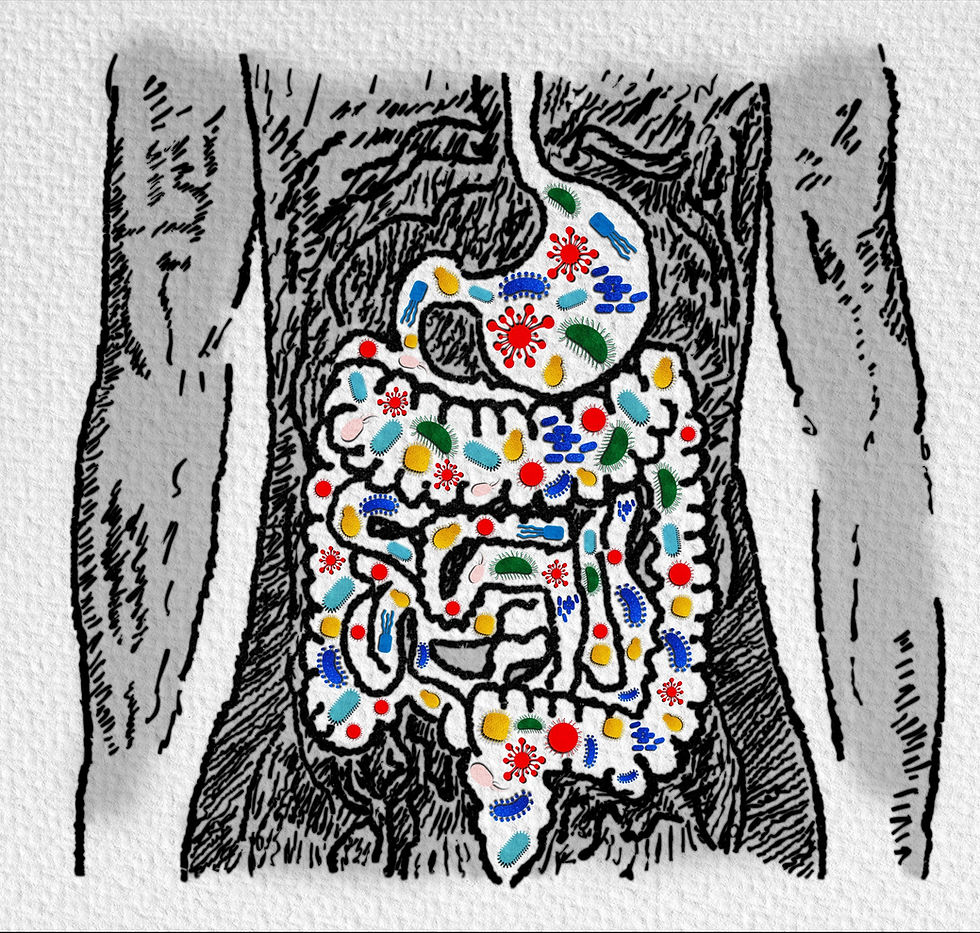IS YOUR DIGESTION UP TO SPEED?
- info848287
- Mar 22, 2023
- 3 min read
Updated: Jan 31, 2024

Ah, the joys of eating, whether it be fine dining, a good healthy home-made meal, some “comfort food” or a real indulgence. We share our enthusiasm about good restaurants or recipes with gusto, often over dinner with friends.
What we don’t discuss are the further pleasures of passing the residues of that meal, when our system is working well! A well-formed, smoothly-passed bowel movement can be very satisfying too. But the woes that can ensue if your system is not up to speed! We consider constipation to be less than one complete and satisfying bowel movement a day. For many people constipation is an unnecessary norm. Hence those books you see in people’s bathrooms: we don’t think people should have time to read in there! SO WHAT IS “BOWEL TRANSIT TIME”? Transit time is the time between input and output, or how long it takes food to get from our top to our bottom, and it is very important to our long-term wellbeing. Yet not many people know how long that time should be, or even how long it is for them. WHY IS TRANSIT TIME SO IMPORTANT? If it is too short, we may not absorb all the nutrients from our food, and will likely have diarrhea. During the hours the stool sits in the large intestine, the body recycles water from it, and if it moves too fast, all that fluid goes with it. That’s why you should drink extra fluids if you have diarrhea. Diarrhea is usually short-term, after eating something your body wants to get rid of. In this case, diarrhea is a protective mechanism, shooting the bad stuff out of your system ASAP. If you are constipated, waste stays in the bowel for a long time, and some of the chemicals your body doesn’t need gets resorbed. These can include toxins, hormone residues and cholesterol, that then get taken straight back up to your hard-working liver. If the load is more than your liver can deal with, some toxins may circulate around your body and be stored in fat cells or even dumped in other tissues. Anyone who has experienced constipation knows what it’s like to feel crappy! That’s caused by the toxins that have been reabsorbed, along with the toxins made by bacterial fermentation. That feeling alone is enough to let you know that constipation isn’t good for you! In our practices, we notice that many of our patients experience constipation. It seems a shame to us that people aren’t empowered to help themselves with this, so we decided to do something about that, starting with telling you how to measure your transit time. Fortunately, it’s incredibly cheap and easy to check whether your food is being digested at a healthy rate. That’s why detox is so important. You can learn much more about this in our Liver Masterclass. HOW DO I CHECK THE SPEED OF MY TRANSIT TIME? Is your system a slow boat or a bullet train? It’s easy to figure out. All you need is a clock and some corn, peas or beets. You’ve probably already guessed what to do next… At a time when you haven’t eaten that food for at least a week, have a meal that is generous with corn (or whatever food you have chosen). Purposely don’t chew a couple of mouthfuls as thoroughly as usual. Note the time of the meal. Then just keep an eye out for the corn (or other tell-tale food) in your stool as it sits in the toilet and calculate the time it took to get there. It should take 12 - 24 hours. It’s as simple as that! If you use corn, please try to use organic corn. The pesticide Round-up (glyphosate) is sprayed on a lot of corn and isn’t good for you. And please note, if you use beets, your stool may come out dark red, and some red may leach into the water: don’t panic, that’s normal! If your bowel transit time is perfect, congratulations! If it is a bit slow, you don’t need to take purging laxatives: there are more gentle and natural ways to get things moving. Look for more on that in our upcoming blog “Happiness is a good poop!”




Comments